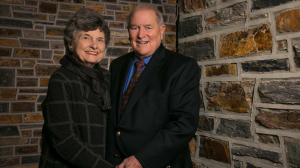A Calling to Serve
Two years ago, Donald Lucey, MD’63, planted a longleaf pine tree in the backyard of his home in Greensboro, North Carolina. His son bought it for him to celebrate his induction into the Order of the Long Leaf Pine, among the most prestigious awards presented by the governor of North Carolina to people who have provided exemplary service to the state and their communities.
Lucey, a clinical professor emeritus of urology at the University of North Carolina at Chapel Hill, has a long-term commitment to giving back and serving others. In 1985, he founded the Urban Ministries’ Open Door Clinic in Raleigh, North Carolina’s first free clinic, to provide medical care to uninsured patients. When demand increased, Lucey helped establish the North Carolina Association of Free and Charitable Clinics, which supports today 83 clinics all over the state. His passion for helping others is “particularly a faith-based decision,” he says. “This is something that you should do, so buddy, go do it.”
Lucey has participated in physician missions from Raleigh, North Carolina, to Vietnam and Nicaragua. He made rounds with urologists in hospitals in Ho Chi Minh City and Hanoi, Vietnam, and for seven years in a row, he traveled every summer to Leon, Nicaragua, to operate on patients and to train young general surgeons to become urologists. “They didn’t have any urologists at the hospital,” he says. “The young guys caught on pretty quickly, and I’m so proud of that.”
In 2003, the Duke Medical Alumni Association honored Lucey with the Humanitarian Award for improving health care for underserved populations.
He has applied his passion for helping others to Duke, as well. Lucey and his wife of nearly 60 years, Shirley, have long supported the Davison Club, which honors the legacy of founding dean Wilburt Cornell Davison, MD, whom Lucey got a chance to meet when he was a student. Lucey attended the University of Florida as an undergraduate, and when he became interested in medicine, he chose Duke. “I always thought that you should attend the best school that you can qualify for when searching for a graduate education, and Duke was a good fit for me,” he says.
Lucey credits James Glenn, MD, then chief of the Division of Urology, and Everett Anderson, MD, then chief resident in urology, as his influential mentors at Duke. “Even though I was a ‘lowly’ medical student on the urology rotation, these two gentlemen treated me as if I existed,” he says. “Everett was an excellent surgeon who worked hard and enjoyed his work, and I thought to myself, ‘Maybe I can do that too.’”
In 1971 Lucey started a private urology practice in Raleigh, where he served patients for 34 years.
At 82 years old, Lucey remains active in his community. He serves on the board of Mustard Seed Community Health, a free clinic in Greensboro, North Carolina, and helps with fundraising efforts. “It’s a little different than operating on people, but I’m earning my stripes as a fundraiser,” he says.
The Davison Club
Gifts to the Davison Club provide critical support for the Duke Medical Annual Fund for scholarships, research, and other School of Medicine priorities.
Benefits of Membership
- Invitations to social events with Duke faculty members, students, and other benefactors.
- Your name will be included on the Trent Semans Center for Health Education and Duke Clinic's annual recognition wall.
- You will receive DukeMed Alumni News magazine twice a year.
- Upon request, we will send you a Davison Club gold-filled lapel pin.
Learn more about the Davison Club
Davison Club Gift Levels
- $25,000 Innovators Society
- $10,000 Leadership Society
- $5,000 Dean’s Circle
- $2,500 Davison Fellow
- $1,000 Member



